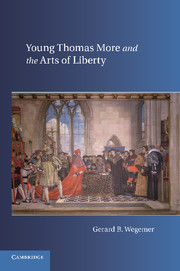Book contents
- Frontmatter
- Contents
- List of Illustrations
- Acknowledgments
- List of Abbreviations
- 1 Young Thomas More
- 2 Fashioning Peace and Prosperity
- 3 Cicero's and More's First Citizens
- 4 More's Earliest Views of Humanitas, Libertas, and Respublica, 1500–1506
- 5 More's Life of Pico della Mirandola (c. 1504–1507)
- 6 More's 1509 Coronation Ode
- 7 Political Poems of 1509–1516
- 8 Richard III
- 9 Utopia
- 10 The Un-Utopian Thomas More Family Portrait
- 11 The Arts of Liberty
- Works Cited
- Index
11 - The Arts of Liberty
Can Peace and Prosperity Be Fashioned by “Sound Deliberation”?
Published online by Cambridge University Press: 25 October 2011
- Frontmatter
- Contents
- List of Illustrations
- Acknowledgments
- List of Abbreviations
- 1 Young Thomas More
- 2 Fashioning Peace and Prosperity
- 3 Cicero's and More's First Citizens
- 4 More's Earliest Views of Humanitas, Libertas, and Respublica, 1500–1506
- 5 More's Life of Pico della Mirandola (c. 1504–1507)
- 6 More's 1509 Coronation Ode
- 7 Political Poems of 1509–1516
- 8 Richard III
- 9 Utopia
- 10 The Un-Utopian Thomas More Family Portrait
- 11 The Arts of Liberty
- Works Cited
- Index
Summary
What Is the Best Form of the Respublica?
A senator is elected by the people to rule; a king attains this end by being born. In the one case blind chance rules; in the other, sound deliberation.
Thomas More, Epigram 198/1, 12–13If perchance wrath were to bring powerful chieftains to war, your nod will promptly put an end to that wrath, such reverence for your sacred majesty have your virtues merited.
Thomas More, Coronation Ode for Henry VIII (1509), 19/146–49We are taught … by the authoritative nod of the laws to subdue our passions, to bridle every lust, to protect our own property, and to keep our thoughts, eyes, and hands off what belongs to others.
Cicero, De Oratore 1.194In every human being, “reason ought to reign like a king,” and in every respublica, “sound deliberation” is the best way to rule. So we saw in Chapter 7. If that were true, a nation could be ruled “by the authoritative nod of the laws” – wisely, freely, without violence. Yet, is that not utopian? Is that not utterly impossible? Certainly it is, without a nation's education in the arts of liberty, which are the work of deliberative reason. At their best, those arts have given rise to good customs and good fashionings of law that protect self-governing and free citizens: fashionings such as private property, money, and contracts; fashionings that are grounded in a careful and extensive study of the human soul and the universe. So Cicero and More argued.
- Type
- Chapter
- Information
- Young Thomas More and the Arts of Liberty , pp. 176 - 190Publisher: Cambridge University PressPrint publication year: 2011



